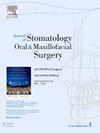口腔癌患者术后吞咽困难的预测:一项前瞻性队列研究。
IF 1.8
3区 医学
Q2 DENTISTRY, ORAL SURGERY & MEDICINE
Journal of Stomatology Oral and Maxillofacial Surgery
Pub Date : 2024-10-01
DOI:10.1016/j.jormas.2024.101957
引用次数: 0
摘要
目的:本研究旨在确定口腔癌患者术后吞咽困难的自主风险因素,并构建提名图预测模型,以提高临床风险评估的准确性和可行性:本研究旨在确定口腔癌患者术后吞咽困难的自主风险因素,并构建一个提名图预测模型,以提高风险评估的准确性和临床可行性:2022年3月至7月,在头颈外科接受手术治疗的口腔癌患者中开展了一项前瞻性队列研究。使用术后吞咽困难风险因素问卷收集临床数据。吞咽功能采用曼氏吞咽能力评估-口腔癌(MASA-OC)进行评估。拉索回归确定了潜在的预测变量,随后进行了单变量和多变量逻辑回归分析。使用 R Studio 4.1.2 开发了一个预测模型,并通过 ROC 曲线、Hosmer-Lemeshow 检验和校准曲线进行了严格评估。利用 Bootstrap 方法对 1000 个重复样本进行了内部验证:研究对象包括 257 名口腔癌患者,其中 73.9% 的患者在术后出现吞咽困难。独立预测因素包括功能状态、抑郁症状、pT分期、手术技术、舌面成形术、上颌骨切除术和术后鼻咽管保留。预测模型的 AUC 为 0.933,灵敏度为 90.9%,特异性为 81.7%。Hosmer-Lemeshow 检验(P = 0.715)和 C 指数(0.934)表明模型拟合度令人满意。内部验证的 AUC 为 0.912,灵敏度为 93.3%,特异度为 63.8%。校准曲线显示预测结果与观察结果一致:综合公认风险因素的提名图有望预测口腔癌患者术后吞咽困难的情况,从而提高精确度并帮助医护人员进行风险评估和制定患者护理策略。本文章由计算机程序翻译,如有差异,请以英文原文为准。
Prediction of postoperative dysphagia in patients with oral cancer: A prospective cohort study
Objectives
This study aims to identify autonomous risk factors for postoperative dysphagia in oral cancer patients and construct a nomogram prediction model to improve risk assessment accuracy and feasibility in clinical settings.
Methods
A prospective cohort study was conducted from March to July 2022 among oral cancer patients undergoing surgical interventions at the Department of Head and Neck Surgery. Clinical data were collected using the Postoperative Dysphagia Risk Factor Questionnaire. Swallowing function was assessed with the Mann Assessment of Swallowing Ability-Oral Cancer (MASA-OC). Lasso regression identified potential predictor variables, followed by univariate and multivariate logistic regression analyses. A predictive model was developed using R Studio 4.1.2 and rigorously evaluated with ROC curves, Hosmer-Lemeshow tests, and calibration curves. Internal validation utilized Bootstrap methodology with 1000 repetitive samples.
Results
The cohort included 257 oral cancer patients, with 73.9 % experiencing postoperative dysphagia. Independent predictors included functional status, depressive symptoms, pT stage, surgical techniques, glossoplasty, maxillectomy, and post-surgery nasopharyngeal tube retention. The predictive model achieved an AUC of 0.933, sensitivity of 90.9 %, and specificity of 81.7 %. Hosmer-Lemeshow test (P = 0.715) and C-index (0.934) indicated satisfactory model fit. Internal validation yielded an AUC of 0.912, sensitivity of 93.3 %, and specificity of 63.8 %. Calibration curves demonstrated alignment between predicted and observed outcomes.
Conclusion
A nomogram integrating recognized risk factors shows promise in predicting postoperative dysphagia in oral cancer patients, enhancing precision and aiding healthcare professionals in risk evaluation and patient care strategies.
求助全文
通过发布文献求助,成功后即可免费获取论文全文。
去求助
来源期刊

Journal of Stomatology Oral and Maxillofacial Surgery
Surgery, Dentistry, Oral Surgery and Medicine, Otorhinolaryngology and Facial Plastic Surgery
CiteScore
2.30
自引率
9.10%
发文量
0
审稿时长
23 days
 求助内容:
求助内容: 应助结果提醒方式:
应助结果提醒方式:


